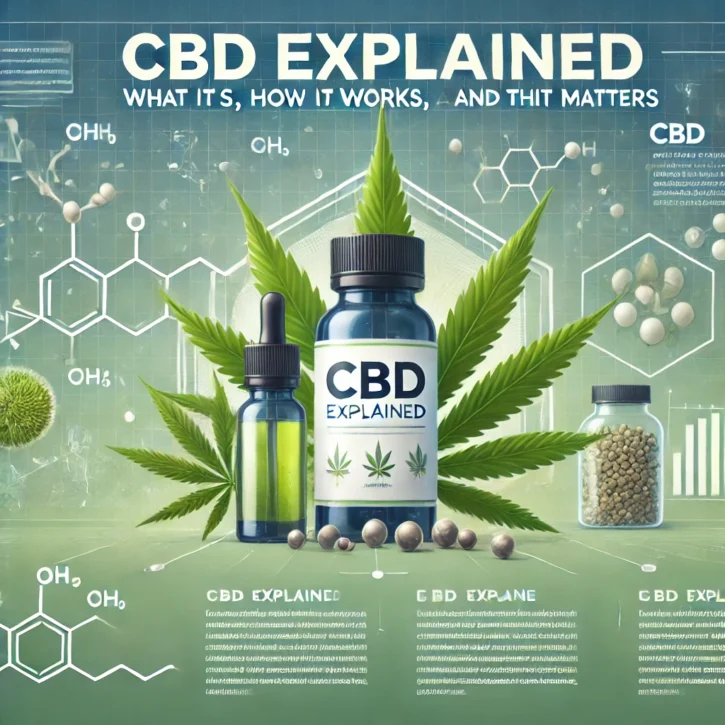CBD, short for cannabidiol, has gained immense popularity in recent years for its potential health benefits. From pain relief to anxiety management, CBD is being widely discussed in wellness and medical communities. But what exactly is CBD, how does it work, and why does it matter? In this article, we explore these questions in-depth to provide a comprehensive understanding of CBD.
What Is CBD?
Understanding Cannabidiol
CBD is a naturally occurring compound found in the Cannabis sativa plant. Unlike THC (tetrahydrocannabinol), the psychoactive component of cannabis, CBD does not cause a “high.” Instead, it is known for its potential therapeutic effects, which have made it a sought-after compound in various industries, including health and wellness.
Sources of CBD
CBD is primarily extracted from two sources:
- Hemp: Contains high levels of CBD and minimal THC (less than 0.3%), making it legal in many countries.
- Marijuana: Contains higher THC levels and is subject to stricter regulations.
How CBD Works in the Body
The Endocannabinoid System (ECS)
CBD interacts with the body’s endocannabinoid system (ECS), which plays a crucial role in regulating processes like mood, pain, immune response, and sleep. The ECS consists of three main components:
- Endocannabinoids: Naturally occurring cannabinoids in the body.
- Receptors (CB1 and CB2): Found in the brain and immune system, respectively.
- Enzymes: Break down cannabinoids once they have carried out their function.
Mechanism of Action
Unlike THC, which binds directly to CB1 receptors in the brain, CBD interacts with ECS receptors indirectly. It influences receptor activity and enhances the body’s ability to maintain balance (homeostasis). This interaction explains why CBD is being explored for its potential health benefits.
Potential Benefits of CBD
Pain Relief
CBD may help reduce chronic pain by interacting with neurotransmitters and reducing inflammation. Studies suggest that CBD can be beneficial for conditions like arthritis, multiple sclerosis, and migraines.
Anxiety and Stress Reduction
CBD is known to have calming effects, which can be beneficial for people suffering from anxiety disorders, PTSD, and insomnia. It is believed to interact with serotonin receptors, helping to regulate mood and stress responses.
Anti-Inflammatory Properties
CBD possesses anti-inflammatory properties that make it useful for treating conditions such as acne, inflammatory bowel disease (IBD), and other chronic inflammatory conditions.
Neuroprotective Benefits
Research suggests that CBD may have neuroprotective properties, which could be beneficial for individuals with neurodegenerative diseases like Alzheimer’s, Parkinson’s, and epilepsy.
Potential Heart Health Benefits
CBD has been linked to lower blood pressure and improved circulation, which may help reduce the risk of cardiovascular diseases.
Types of CBD Products
CBD Oil and Tinctures
One of the most popular ways to consume CBD, oils and tinctures are taken sublingually (under the tongue) for quick absorption.
CBD Edibles
Edibles, such as gummies and capsules, provide a convenient and tastier way to consume CBD, though they take longer to take effect due to digestion.
CBD Topicals
Creams, balms, and lotions infused with CBD are used for localized relief from pain and inflammation.
CBD Vapes
Vaping CBD allows for rapid absorption into the bloodstream, offering quick relief but raising concerns about lung health.
Is CBD Legal?
CBD legality varies by country and state. In the U.S., hemp-derived CBD (with less than 0.3% THC) is federally legal, but regulations differ at the state level. Always check local laws before purchasing or using CBD products.
Possible Side Effects of CBD
While CBD is generally considered safe, some people may experience side effects, including:
- Dry mouth
- Drowsiness or fatigue
- Changes in appetite
- Diarrhea
- Possible interactions with medications
It is always advisable to consult a healthcare professional before using CBD, especially if you are on medication or have underlying health conditions.
How to Choose High-Quality CBD Products
Check Third-Party Lab Testing
Reputable CBD brands provide third-party lab reports to verify purity, potency, and the absence of harmful contaminants.
Look for Full-Spectrum, Broad-Spectrum, or Isolate
- Full-spectrum CBD: Contains all cannabinoids, including trace amounts of THC.
- Broad-spectrum CBD: Contains multiple cannabinoids but is THC-free.
- CBD isolate: Pure CBD without other cannabinoids or terpenes.
Conclusion
CBD has emerged as a promising compound with a wide range of potential health benefits. While research is ongoing, many people have already incorporated CBD into their wellness routines for pain relief, anxiety reduction, and overall well-being. However, it is essential to choose high-quality products and consult a healthcare provider before starting CBD. As regulations evolve, CBD continues to play a significant role in modern health and wellness discussions.



